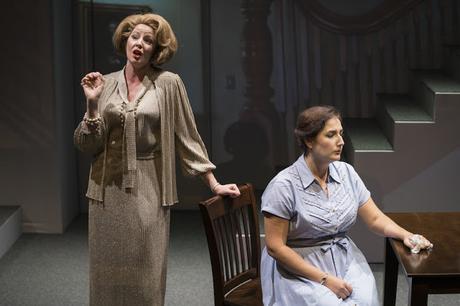by Paul J. Pelkonen

This job is murder: Vera Donovan (Jessica Tyler Wright, left) lectures the title character (Lisa Chavez) in
a scene from Dolores Claiborne. Photo by Sarah Shatz © 2017 New York City Opera.
Stephen King's 1992 novel, itself the basis of a successful 1995 film premiered at the San Francisco Opera, billed by the composer as an "American Tosca." This is not a supernatural story, but rather a study of an isolated community on a fictional Maine island. Its protagonist is a dowdy, middle-aged caregiver accused of murdering her elderly client. Over the course of a police interrogation, Dolores' story is revealed in flashback. The cops learn how she and her daughter Selena suffered different (and equally harrowing) kinds of domestic abuse at the hands of her brutish husband Joe. Dolores killed him. (Good riddance.)
This is ugly stuff, the kind of verismo that might have put off Puccini. Mr. Picker and his librettist, J.D. McClatchey, pull no punches, choosing the dark ending of the original novel rather than the reconciliation of the screen version. This new version reduces the story to its bare bones, with a 14-piece orchestra (playing behind the scenes) and all chorus scenes and hints of local Maine color left on the cutting room floor. In the intimate space of the 59E59 Theater, the violence is harrowing, particularly Joe's whiskey-fueled tantrums. As for Dolores (Lisa Chavez) she is not easy to like but there is something admirable in her sharp tongue and tough personality. She gives a searing performance.
The role requires the entire mezzo instrument, down through the chest to chilling low notes, and up into the heights for the ensembles and the opera's emotional climaxes. It is a star turn much like the Governess in The Turn of the Screw or Marie in Wozzeck. This is a portrait of gravity and strength in the face of almost insurmountable odds: a desperate woman whose actions to save herself have negative consequences. At the end of the work, the magnitude of her sacrifice is revealed in a powerful final scene.
Joe (Thomas Hall) is a brute with a pleasing dark register, which unfortunately stays at the same forte dynamic throughout his performance. This creep beats Dolores and assaults his own daughter, a disgusting, craven figure who gets a just (and cleverly staged) end. As Vera Donovan, Dolores' employer, soprano Jessica Tyler Wright faced her own challenges. Vera is a fascinating figure: cold and calculating in flashbacks, desperate and more senile as her death approaches. She also has to sing in a taxing upper register, and pulled notes down from where there is very little air.
As Selena, Ms. Gennaco also faced a hard task, playing both a traumatized, sexually abused teen and the troubled adult into which she matures. The performance starts almost insignificantly, with a small voice. As time moves forward and the story develops, Selena blossoms. We quickly learn that, while she is able to save Dolores from the murder investigation, her character remains irrevocably damaged by the troubled events of the past. Tenor Spencer Hamlin supplied bright tone to his brief role as the detective on the case.
The show made good use of the steep multi-level space. The white walls became screens for projected scenery. This enabled easy switching of locations as the flashbacks were presented visually. Dolores was interrogated with a video camera that projected its image on the wall overhead, a clever idea that isn't used much. The projections only became problematic in the scene in Selena's "Boston" apartment, when the view was of Gramercy, Madison Square Park and the East River bridges. (Is it that hard to get an image of Boston?) The orchestra remains behind the scenes, which is odd when the door in the police station swings open: instead of a squad room, the Little Tall Island force plays chamber music!
Mr. Picker draws from the playbook of modern composition, with a chamber-sized orchestra (there are only five string players) playing a special reduction of the score commissioned by Mr. Capasso for this production. Leitmotivs for each character and haunting repetition of child-like rhymes recall Britten while the mounting sense of tension and terror reminds one of Berg. Mr. Picker creates an effective atmosphere of dread but the grim story offers little in the way of musical resolution. Perhaps it shouldn't.

